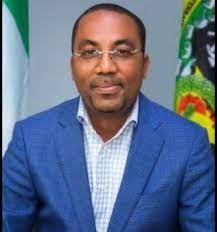.Says we don’t have Vessel Traffic Services
.’Onne, Calabar ports ISO certified’
The Federal Government on Tuesday disclosed that vessels stealing Nigeria’s crude oil usually switch off identification device to avoid being detected by the authorities.
Managing Director of the Nigerian Ports Authority (NPA), Mohammed Koko, who made this known while briefing newsmen at the State House, Abuja, stressed that rogue vessels that are used to steal crude oil in the Niger Delta are turn off their Automation Identification System (AIS) to avoid detection in Nigerian territorial waters.
He explained that such ships evade arrest because they switch off their onboard automated tracking system that displays the vessel’s position and others in the vicinity.
His words: “The intelligence persons bringing in vessels to steal crude, one of the things they do is, they short down the AIS. This is what is needed in terms of transmission for you to even know, when the vessel comes in and the location they go to. They come in legally but then they go by the left hand side to commit illegal activities after switching of their AIS”.
Koko said the NPA is now in the process of procuring Vessel Traffic Services (VTS) to enable it to identify, locate and monitor all vessels in the nation’s waters.
According to him, the agency has been trying to acquire the VTS for about 10 years now and has just identified a certified consultant, while also working with the Nigeria Liquefied and Natural Gas (NLNG) Company to help with critical detection.
He assured that the technology will be procured before the end of the administration of President Muhammadu Buhari.
Also, the Nigerian Ports Authority (NPA) says the habours departments of Onne and Calabar ports have secured the International Standard Organisation(ISO) certification.
Managing Director of NPA, Mohammed Koko, disclosed on Tuesday at the Presidential Villa, Abuja, while featuring in the 55th session of State House Briefing organised by the Presidential Communications Team.
Koko said that such certification would make ports operations more efficient, adding that efforts were underway to ensure that other ports were certified
The NPA boss said that the authority had come up with strategic initiatives–first of which was aggressive ports infrastructure renewal and modernisation.
“And of course, there would be government funding for that; private sector funding is also being considered; or a hybrid—in such a way that government brings some of the funds and then private sector or multi-lateral agencies bring some.
“And then, we realise the need for automation; automation brings efficiency; it reduces cost; it plugs the leakages.
“It is one the things we are working on and we are working with multi-lateral international donor agencies, the private sector; also hybrid funding will be used for that.’’
He said that ISO certification meant that the ports would be more competitive.
“We decided to start ISO certification for our ports and I am happy to announce that the habours departments of two of our ports have been ISO certified; that is Onne Port and Calabar Port.
“Warri will soon be on; and then the other ports also will soon be certified.
“We believe in the certification of these port operations, our main core function is in the maritime and habours department; so, if we are able to get ISO certification for that, it makes our ports more competitive, processes easier and be more transparent.’’
Koko said that the authority also came up with up with an initiative of export promotion in order to support the Federal Government’s initiative on diversification of the economy and encourage exports.
He said that all terminal operators were mandated to have warehouses for sorting out and processing of exports.
The managing director said that private sector was also brought in to be involved in export processing.
“And in terms of muti-modalism, formerly over 95 per cent of all cargo was being moved by road; and that’s not efficient; it is expensive; the road can’t carry it.
“And we have worked with Nigerian Railway Corporation under the directive of the Federal Ministry of Transportation to see that the train services are deployed to the ports but we also came up the barge services,’’ he said

























